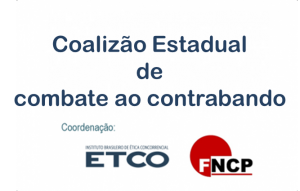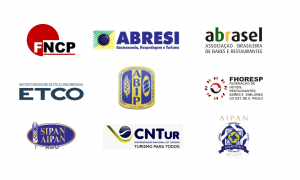Tax evasion with illegal cigarettes totaled R $ 2,15 billion
in the period between 2010 and 2015
São Paulo, July 1, 2016 - On the State Day to Combat Smuggling (1/7) the State Coalition to Combat Smuggling formed by the Brazilian Association to Combat Counterfeiting (ABCF), the Brazilian Institute for Competition Ethics (ETCO), the National Forum Against Piracy and Illegality (FNCP), the Brazilian Association of Bars and Restaurants (Abrasel), the Brazilian Association of Gastronomy, Lodging and Tourism (Abresi), the Brazilian Association of the Bakery and Confectionery Industry (Abip), the National Tourism Confederation (CNTur), the Federation of Hotels, Restaurants, Bars and Similars of the State of São Paulo (Fhoresp), the Union of the Bakery and Confectionery Industry of Santo André (Sipan) and the Union of the Bakery and Confectionery Industrialists of São Paulo (Sindipan) are united to sensitize the government and society about the impacts of smuggling on the economy and security of the State of São Paulo, in addition to discussing measures to curb the growth of this crime.
Currently, São Paulo is the state most affected by the crime of smuggling and cigarette is the product that leads the ranking of illegal products. Of every 10 cigarettes sold in the state, four entered the borders illegally. The leading sales brand, with 25% market share, is Eight, manufactured in Paraguay.
In 2015, tax evasion with cigarettes in São Paulo was R $ 751 million, an increase of 169% compared to 2010, according to a survey by Ibope. In the accumulated result for the last five years, tax evasion with the cigarette sector alone was R $ 2,15 billion.
In addition to causing losses to public collectors by not collecting taxes, smuggling takes jobs from São Paulo workers and increases crime. “Smuggling threatens the sustainability of several sectors of the formal economy. Cigarettes from Paraguay have no inspection and quality control, ”says Rodolpho Ramazzini, director of the Brazilian Association to Combat Counterfeiting (ABCF).
The main causes for the increase in smuggling are the indiscriminate readjustments in taxes on various products and the State government's negligence in protecting borders. "The higher the taxes on national products, the more competitive the illegal product becomes and the more the population suffers from the increase in crime", ponders FNCP president, Edson Vismona.
The State Coalition wants to propose to the authorities the creation of a State Plan to face this serious problem. Among the proposed measures are:
* recalibrate the state tax rate (ICMS) levied on products,
* reinforce the inspection of roads considered to be the main smuggling routes,
* integrated work with other public bodies and entities to curb the trade in illegal goods.
So that everyone can experience and identify the real damage of smuggling will be on display at Conjunto Nacional, on Avenida Paulista, the mini-exhibition “The City of Smuggling”, Which simulates all the improvements that could be implemented with the money lost due to contraband.
Last year Brazil lost R $ 115 billion, enough to build 974 hospitals, or 57 thousand daycare centers or 22 thousand public schools. The work, created by the artist Mauro Brincante, will be on display until the 5th of July.
On this 1st, a seminar is also being held in São Paulo, with the presence of the Minister of Foreign Affairs, José Serra; the Secretary of Public Security (SSP) of São Paulo, Mágino Alves Barbosa Filho and experts on the topic to discuss the relationship between the increase in taxes and crime and the impacts of smuggling on society.





